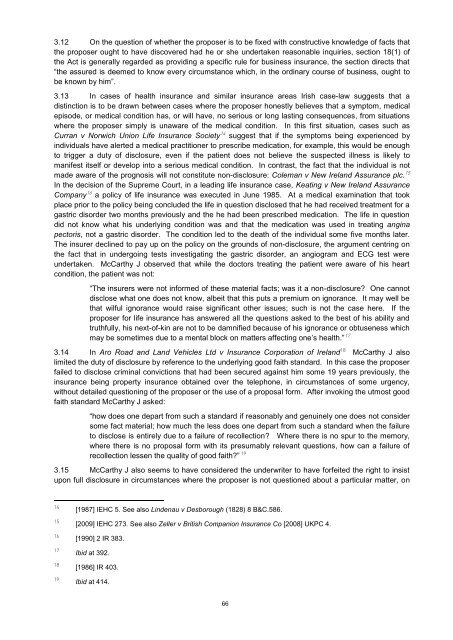Insurance Contracts CP - Law Reform Commission
Insurance Contracts CP - Law Reform Commission
Insurance Contracts CP - Law Reform Commission
You also want an ePaper? Increase the reach of your titles
YUMPU automatically turns print PDFs into web optimized ePapers that Google loves.
3.12 On the question of whether the proposer is to be fixed with constructive knowledge of facts that<br />
the proposer ought to have discovered had he or she undertaken reasonable inquiries, section 18(1) of<br />
the Act is generally regarded as providing a specific rule for business insurance, the section directs that<br />
―the assured is deemed to know every circumstance which, in the ordinary course of business, ought to<br />
be known by him‖.<br />
3.13 In cases of health insurance and similar insurance areas Irish case-law suggests that a<br />
distinction is to be drawn between cases where the proposer honestly believes that a symptom, medical<br />
episode, or medical condition has, or will have, no serious or long lasting consequences, from situations<br />
where the proposer simply is unaware of the medical condition. In this first situation, cases such as<br />
Curran v Norwich Union Life <strong>Insurance</strong> Society 14 suggest that if the symptoms being experienced by<br />
individuals have alerted a medical practitioner to prescribe medication, for example, this would be enough<br />
to trigger a duty of disclosure, even if the patient does not believe the suspected illness is likely to<br />
manifest itself or develop into a serious medical condition. In contrast, the fact that the individual is not<br />
made aware of the prognosis will not constitute non-disclosure: Coleman v New Ireland Assurance plc. 15<br />
In the decision of the Supreme Court, in a leading life insurance case, Keating v New Ireland Assurance<br />
Company 16 a policy of life insurance was executed in June 1985. At a medical examination that took<br />
place prior to the policy being concluded the life in question disclosed that he had received treatment for a<br />
gastric disorder two months previously and the he had been prescribed medication. The life in question<br />
did not know what his underlying condition was and that the medication was used in treating angina<br />
pectoris, not a gastric disorder. The condition led to the death of the individual some five months later.<br />
The insurer declined to pay up on the policy on the grounds of non-disclosure, the argument centring on<br />
the fact that in undergoing tests investigating the gastric disorder, an angiogram and ECG test were<br />
undertaken. McCarthy J observed that while the doctors treating the patient were aware of his heart<br />
condition, the patient was not:<br />
―The insurers were not informed of these material facts; was it a non-disclosure? One cannot<br />
disclose what one does not know, albeit that this puts a premium on ignorance. It may well be<br />
that wilful ignorance would raise significant other issues; such is not the case here. If the<br />
proposer for life insurance has answered all the questions asked to the best of his ability and<br />
truthfully, his next-of-kin are not to be damnified because of his ignorance or obtuseness which<br />
may be sometimes due to a mental block on matters affecting one‘s health.‖ 17<br />
3.14 In Aro Road and Land Vehicles Ltd v <strong>Insurance</strong> Corporation of Ireland 18 McCarthy J also<br />
limited the duty of disclosure by reference to the underlying good faith standard. In this case the proposer<br />
failed to disclose criminal convictions that had been secured against him some 19 years previously, the<br />
insurance being property insurance obtained over the telephone, in circumstances of some urgency,<br />
without detailed questioning of the proposer or the use of a proposal form. After invoking the utmost good<br />
faith standard McCarthy J asked:<br />
―how does one depart from such a standard if reasonably and genuinely one does not consider<br />
some fact material; how much the less does one depart from such a standard when the failure<br />
to disclose is entirely due to a failure of recollection? Where there is no spur to the memory,<br />
where there is no proposal form with its presumably relevant questions, how can a failure of<br />
recollection lessen the quality of good faith?‖ 19<br />
3.15 McCarthy J also seems to have considered the underwriter to have forfeited the right to insist<br />
upon full disclosure in circumstances where the proposer is not questioned about a particular matter, on<br />
14<br />
15<br />
16<br />
17<br />
18<br />
19<br />
[1987] IEHC 5. See also Lindenau v Desborough (1828) 8 B&C.586.<br />
[2009] IEHC 273. See also Zeller v British Companion <strong>Insurance</strong> Co [2008] UKPC 4.<br />
[1990] 2 IR 383.<br />
Ibid at 392.<br />
[1986] IR 403.<br />
Ibid at 414.<br />
66

















